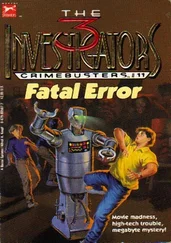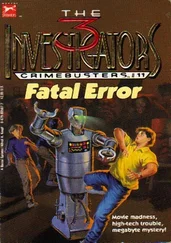Love
Dad .
PS. Don’t tell your mother about this, will you?
I stared at the letter. I couldn’t suppress a smile. There was the evidence that he believed in me. Incontrovertible. Fifty thousand quid.
I realized immediately that I couldn’t accept it. I didn’t know what my father’s savings amounted to, but there had never been very much money around the house and I was pretty confident that the cheque I was holding accounted for a large proportion of them. He would need the money for his retirement. Sure, I believed in ninetyminutes.com, but I knew it was risky. Not the place to put your retirement nest egg.
The injunction not to tell my mother was another problem. If I went ahead and cashed the cheque, that would be a disaster just waiting to happen. I picked up the phone and punched out my parents’ number. After some small talk with my mother, she put him on.
‘Dad, I don’t believe what came in the post today! Are you crazy?’
‘Not at all,’ he said. I could hear the smile in his voice, which was low, presumably so my mother wouldn’t hear. ‘I’m sure it will be an excellent investment.’
‘But, Dad. It’s a start-up! It could go bust within a year. It’s an enormous risk.’
‘That’s the point, David. We talked about it at lunch. I feel it’s about time I took a risk and what better way to take it? The Internet is going to change the way we live, even I realize that. And I have confidence in you. I can’t think of anyone else I would trust to do what you’re doing. At my age I can’t give up everything and start a company myself. But I can invest in one.’
‘I’m sorry, Dad. I can’t accept it.’
‘What do you mean, you can’t accept it? Is fifty thousand too little? What’s the problem?’ He was beginning to sound angry. My father rarely sounded angry.
‘It’s not that. It’s just if I lose your money I’ll feel terrible.’
‘And what if ninetyminutes.com is a runaway success? What if I could have earned ten times my money and you hadn’t let me invest? How would you feel then?’
‘Oh, Dad, come on...’
‘No. You come on. You have to admit there’s a good chance that this is going to work, don’t you?’
‘Yes, I do.’
‘Well then?’
‘I can’t let you do this, Dad.’
‘David. I don’t believe this.’ My father’s voice was still low to prevent my mother hearing, but he sounded genuinely angry now. ‘I am capable of making up my own mind about investments, you know. I know this is high risk. I want to take a risk, just like you. And in the same way I won’t stop you from risking your career, you shouldn’t stop me from risking what is, after all, only money.’
I took a deep breath. ‘OK, Dad, I’ll think about it.’
‘David—’
‘I said, I’ll think about it. Bye.’ I hung up. I rarely fought with my father, if ever, and I felt bad. I knew the right decision was not to accept his money.
But we needed money from somewhere. Guy was finding it difficult to pin down a meeting with Torsten in Hamburg and he was still adamant he didn’t want to ask his father. Which left us with the venture capitalists.
Venture-capital firms invest in new or growing companies. Until the late 1990s they were cautious and careful. It was not unheard of for them to spend months investigating a start-up company before deciding that they did not want to invest. I knew what they were looking for: experienced management, proprietary technology and a proven method of making money. None of which Guy and I had. Which was why I had been reluctant to approach them until we had at least a website to show that we meant business.
But Guy couldn’t wait that long. And in the increasing heat of the last year of the century, neither could they. Stories were emerging of venture capitalists falling over themselves to back young entrepreneurs barely out of business school. Boo.com, an internet fashion retailer that was nothing but an idea and two hip Swedish founders who had started and sold an internet bookshop, had just raised forty million pounds. We only needed three million to get us going. Guy saw no reason why we shouldn’t get it.
So, despite my doubts, I polished up our plan. Now all I needed was people to send it to.
The place was heaving. It was Tuesday, the first Tuesday of May, and I was at First Tuesday, the event for anyone in the internet world. It had all started six months before when a group of entrepreneurs had agreed to meet in a pub once a month to share war stories, and it had grown and grown. It was now the place to network, to find employees, office space, clients, suppliers, and that most precious commodity of all, money. I was there to make contact with venture capitalists, to give them the thirty-second ‘elevator pitch’, to collect their cards and send them our plan. Pretty straightforward, really. I was wearing a green badge, showing I was an entrepreneur. The venture capitalists were wearing red badges.
The venue was the converted warehouse of an internet consultancy company near Oxford Street, quite close to Mandrill’s offices. There must have been two hundred people there, all talking frantically. Most were my age or younger, most were dressed in T-shirts or fleeces, nearly all were men, and nearly all had green badges.
I took a deep breath and dived in. I was searching for the red badges. They were few and far between, but I soon realized how to spot them: they were the ones in the middle of tight groups of men and women all talking at once. Be forceful, I thought, pushing my way through to one such group. At its centre was a young-looking man in a suit being harangued by a voluble American who had an idea for selling wedding gifts over the net. It was clear he wasn’t going to go away until the VC had given him his card and told him to send him a plan. There was an unruly crush of green badges in front of me vying to give their own pitches. Most of them were selling something mundane over the Internet, from babyloves.com selling gifts for babies to lastrest.com selling prepaid funeral services. I wondered who lastrest.com’s target customers were — perhaps people who woke up in the middle of the night with chest pains and nipped off to their computer to make sure their funeral was sorted before it was too late. Some of the ideas were highly technical and incomprehensible. One or two made some kind of sense. But the venture capitalist had no chance of distinguishing one from the other.
I tried to get the attention of the red badges, I really did. I managed to exchange cards with one harassed woman before being elbowed out of the way by the wedding-gift American. But otherwise, nothing. You had to be very pushy to get attention. Most of the green badges were expert attention-seekers. They left me way behind.
I retired to the gents. Standing next to me was a man in a suit. I didn’t look up at the face, but I saw the lapel. A red badge. Now, if I were a true entrepreneur I would have no compunction about foisting myself and my elevator pitch on a man while he was urinating. It was then that I discovered something about myself. I wasn’t a true entrepreneur. I kept my eyes down.
The suit next to me moved. ‘David? David Lane?’
I looked up at his face. ‘Henry, how are you?’
It turned out I knew the owner of the badge. Henry Broughton-Jones had trained with me as an accountant. He was a tall man with thinning fair hair brushed back above a high forehead. His father was a gentleman farmer in Herefordshire, and you would have thought Henry would have been happier in an agricultural college than a big firm of accountants, but in the end he had done rather well. When I had left the firm he had been one of the rising stars groomed for eventual partnership.
Читать дальше












